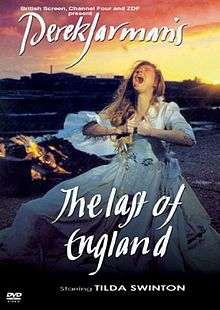The Last of England (film)
| The Last of England | |
|---|---|
 | |
| Directed by | Derek Jarman |
| Produced by |
James Mackay Don Boyd |
| Written by | Derek Jarman |
| Starring |
Tilda Swinton Nigel Terry Jonathan Phillips Spencer Leigh Spring - Mark Adley |
| Narrated by | Nigel Terry |
| Music by |
Simon Fisher Turner Andy Gill Marianne Faithfull Mayo Thompson Diamanda Galás Barry Adamson |
| Cinematography | Derek Jarman, Christopher Hughes, Richard Heslop, Cerith Wyn Evans |
| Edited by | Derek Jarman, Peter Cartwright, Angus Cook |
Release date |
,
|
Running time | 87 min. |
| Country | United Kingdom |
| Language | English |
| Budget | GBP£276,000 |
The Last of England is a 1987 British arthouse film directed by Derek Jarman and starring Tilda Swinton.
It is a poetic, rather than realistic, depiction of what Jarman felt was the loss of traditional English culture in the 1980s . It is named after a painting by the artist Ford Madox Brown.
Jarman wrote a book to accompany the film, which deals more explicitly with the relationship he had with his father, who was a Lancaster bomber pilot in the Second World War. Jarman used the impact of his father's despair, depression and violence on his own artistic vision. The depression that his father suffered is attributed to the high number of fatalities that bomber crews experienced and the carpet-bombing of civilians. The film is also a means to explore his vision of the dissolution of traditional (pre-war) English life . (See his earlier film Jubilee to contextualize it with the 1977 punk movement of the time).
The book and to a lesser extent the film are very much in the tradition of Roland Barthes Camera Lucida, Susan Sontag's On Photography, Jeanette Winterson's 'Art Objects' and to a lesser extent John Berger's Ways of Seeing in that he has used the deeply familiar and personal as a vehicle for dialogue about art and contemporary culture.
Derek Jarman received the 1988 Teddy Award in Berlin for the film.